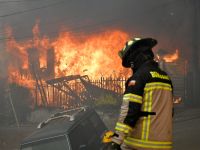In the whispering hotel lobbies at the latest OPEC get-together, Iraq managed to hold center stage -- despite not even sending its oil minister to the pow-wow.
As officials from the Organization of Petroleum Exporting Countries (OPEC) on Wednesday mulled a steep output cut to prop up sagging world oil prices, Iraq remained the one variable in the equation that made the sums hard to add up.
Ministers agreed that a reduction of more than five percent of total output was required to ensure that a supply glut does not send prices tumbling. Total output however remains difficult to calculate, given the fact that Iraqi exports have remained fitful at best for weeks following a row with the United Nations over the oil-for-food programme.
And with oil minister Amer Rasheed nowhere to be seen, OPEC ministers were left guessing as to how Iraq's future behavior might affect world oil prices. "We do not know what they (Iraq) are going to do," shrugged Saudi Arabian oil minister Ali al-Nuaimi. "But if there is a shortage, we will make it good."
Ever since it was subjected to UN sanctions following its invasion of Kuwait in 1990, Iraq has remained outside OPEC's quota system. In adjusting its supply to ensure it gets the world crude prices it wants, OPEC thus has to take account of how much Iraq is producing and exporting under its UN oil-for-food programme.
But Iraqi output has recently become highly volatile, after Baghdad shut off exports for 12 days in December amid a dispute with the United Nations over pricing under the oil-for-food programme.
In December, Iraqi output totaled just 1.2 million barrels per day (bpd), less than half the 2.7 million produced in November, according to the Middle East Economic Survey.
Qatari minister Abdullah al-Attiyah said OPEC tentatively was expecting to see Iraqi export volumes return to former oil-for-food levels -- around 2.3 million bpd. "If the opposite happens and the market rises very high then (we will) increase our production."
But analysts said the "Iraq factor" could seriously undermine OPEC efforts to manipulate market supplies in order to secure high prices for crude. They said that a steep OPEC cutback of 1.5 million barrels per day now, coupled with sporadic and depleted Iraqi supplies, could starve markets of crude, send prices spiraling again and make a mockery of OPEC production policy.
If Baghdad persists with low production volumes "prices will quickly begin to rise again," said Leo Drollas, an oil market analyst with the London-based Center for Global Energy Studies.
Roger Diwan, an analyst with the Washington-based Petroleum Finance Company, said that OPEC's output squeeze agreed Wednesday "leaves the market vulnerable because of Iraqi output".
"The virtual absence of Iraqi representatives in Vienna - where just one delegate and the envoy are present -- reveals a lot about the new Iraqi strategy," Diwan added, saying that Iraq was toying with output so as to pile pressure on the United Nations to lift sanctions.
Oil importers such as Europe and the United States want crude volumes to remain high, keeping prices moderate and reducing the risk of oil-shock inflation and recession.
It is this bargaining chip that Iraq hopes to exploit to secure a lifting of the 10-year-old sanctions against Saddam Hussein's regime, said Diwan.—AFP.
©--Agence France Presse 2001.
© 2001 Mena Report (www.menareport.com)







